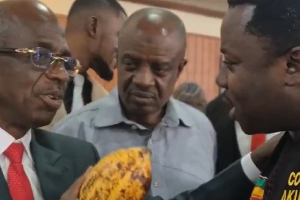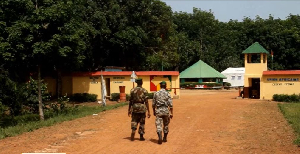By Alex Bossman Baafi
The severe criticisms, demonizing, character assassinations and personal attacks coming from the authorities of Ministry of Finance and Government Statistical Services regarding Dr. Mahamadu Bawumia’s State of the Nation’s address delivered during Ferdinand O. Ayim Memorial Lecture on May 2, 2012, have thrown many macroeconomics students in total confusion. The positions of the government and her statistician try very much to make nonsense of the important subject and application of macroeconomics in the political history of nations in the world
To begin with, we need to understand in simple terms and briefly, the macroeconomics variables of inflation, exchange rate and interest rates.
Inflation: means the general rise in prices throughout the country. It signifies an increase in the cost of living. It is therefore the government’s duty to keep inflation low and stable .Some of the important reasons include facilitating the process of economic growth and also allowing investors to make decisions with confidence. Low inflation will also improve the economic wellbeing of the people and increase job creation.
Exchange Rate: An exchange rate is the rate at which one currency trades (changes hands) for another on the foreign exchange market (a place where foreign currencies are traded for one another). For example, if you want to travel to United States, you will need to exchange your cedis into US dollars. To do this you will have to go to the bank or Forex bureau for the bank or the bureau to quote you the exchange rate for the day. For the sake of explanation, let’s take one dollar is exchanged for one and half cedis as S1.00=GHc1.50. When the value of the cedi falls, you may have to exchange say GHc2.00 for the same $1.00 ($1.00 = GHc2.00). You need more cedis for the same dollar because the cedi is depreciating. When this happens all importers suffer.
Interest Rate: it is the cost of borrowing money. For example, if you borrow GHc1, 000.00 today, from a friend or a bank for a year, and you will pay say GHc1, 200.00 to your friend or the bank, then the cost of borrowing GHc1, 000.00 for a year is GHc200.00 which works up to 20%. The interest rate then is 20%. Thus, inflation impacts on consumers’ income, exchange rates could strongly influence the demand for the country’s export and interest rates affects investment decisions in the country. Perhaps what makes the critical analysis of these variables more important is that, inflation, exchange rates and interest rates could impact on each other and that make their overall assessment of their impact on the economy notoriously complex.
In theory and practice, there is a direct correlation or relationship between inflation on one side and interest rates and exchange rates on the other side. That is to say when inflation is low or falling, it pulls along with it interest rates and exchange rates so that they fall along with inflation. Simply put, when inflation remains low, all things being equal, interest rates and exchange rates remain low. The opposite is true of the relationship among these indicators or variables.
Among these variables, it is inflation which the government or policy planner normally have control over. Interest rates and exchange rates are purely determined by the forces of the market that is demand and supply. Therefore once the government is on top to control both the demand and supply causes of inflation, inflation can be brought under control, and when that is done, all other things remains the same, exchange rates and interest rates could also be brought under control.
What is baffling many in our country today is that, there is an inverse relationship between inflation on one side of the equation and interest rates and exchange rates on the other. That is to say, whilst inflation remains low at single digit 8.8%, interest rates and exchange rates are on the high side. Inflation has been reduced drastically to a single digit but interest rates have remained stubbornly high to the amazement of many.
It is this strange phenomenon inverse relationship which is throwing out economic theory and practice that many economist, consultants and students of macroeconomists are seeking answers to. It is not enough attack the personality of Dr. Bawumia for his excellent observation and revelation of the truth and exposing the facts about the behaviour of these indicators and their impact on our national economy without offering an acceptable explanation.
Dr. Bawumia’s observation is the true position of our economy today which cannot be swept under the carpet. What we need to do as a government or a nation is to brainstorm to find answers to the inverse correlation or relationship of these indicators and their impact on the economy. In my view any serious manager of an economy will not behave as an ostrich but take immediate steps to examine the economic policies in order to right the wrongs.
The fast depreciation of the cedi is due to many factors including the feeling of insecurity in the country. The violence that characterized our biometric voter registration caused fear and panic and sent out bad signals to foreign investors in the country. Many started taking precautionary measures by expatriating part of their capital out of the country leading to capital flight and are causing depreciation of the cedi against foreign currencies. Business confidence in the country is fast waning because many are not convinced that our impending general elections will be devoid of violence so they want to keep their assets in foreign currencies and adopt a wait and see attitude for now.
There is also low agricultural output and therefore the government has to import food especially poultry products and rice. We live in a country where a large section of our farmers cannot embark upon their farming activities to increase output because their farmlands have been invaded by Fulani herdsmen and their cattle from neighboring countries without adequate protect from the government. What do you expect? In terms individual and national security, this government has not done much in this country.
As part of the solution to halt the free fall of the value in the face of so-called single digit inflation, the government has to do more to convince the whole world that there would be peace before, during and after the impending elections in December this year. Though this will prove a little difficult because the harm has already been done, the onus is on the government to rise to the security situation whatever it takes.
Though arguable, the government can also fall on the reserves of the economy by selling dollars to shore up the value of the cedi to the desired appreciable level. This may prove expensive but it is a way out given the circumstances of the case. The long term solution is investing more in agriculture and other productive infrastructure of the country to increase productivity especially in the agricultural sector. These and other monetary and fiscal policies must be implemented quickly to improve the living standards of the suffering masses because the true state of the economy as revealed by Dr. Mahamudu Bawumia, the vice presidential candidate of the largest opposition party, NPP, cannot be disputed.
Email: abkbossman@yahoo.co.uk
Opinions of Saturday, 12 May 2012
Columnist: Baafi, Alex Bossman














